| Srl | Item |
| 1 |
ID:
104675
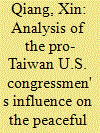

|
|
|
| 2 |
ID:
109737
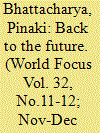

|
|
|
| 3 |
ID:
115088
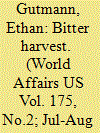

|
|
|
|
|
| Publication |
2012.
|
| Summary/Abstract |
When Wang Lijun made his break for the US consulate in Chengdu on the night of February 6th, he was in a unique position to reveal a series of damaging stories about his superior, Bo Xilai: Bo's familial connection to the suspected murder of British businessman Neil Heywood, siphoning of Chongqing's public funds, and shakedowns of local criminal and triad elements. As former head of the Chongqing Public Security Bureau, Wang also knew that Bo, as Chongqing party secretary, had engaged in surveillance of Politburo members, potentially implying that Bo and other players aligned with Jiang Zemin's faction-most prominently, Zhou Yongkang, secretary of the powerful Political and Legislative Affairs Committee (PLAC)-were thinking about seizing power. Faced with the complexity of China's leadership transition crisis, most Western editors played up the Sopranos aspect of the sordid tale, fixing on the alleged Heywood murder, essentially the same interpretation being relentlessly pushed by the Chinese Communist Party-controlled media, and allowed an even more sinister story to slip by virtually unnoticed. On March 23rd, China's vice minister of health, Huang Jiefu, publicly declared the country's intention to end "organ donations" from executed prisoners. Yet the euphemism didn't conceal the reality, for on the night of February 6th, Wang was in a unique position to reveal one more story-specifically, how the party has been harvesting the organs of their political enemies for years.
|
|
|
|
|
|
|
|
|
|
|
|
|
|
|
|
| 4 |
ID:
116091
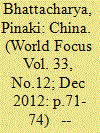

|
|
|
| 5 |
ID:
114839
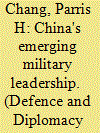

|
|
|
| 6 |
ID:
130581
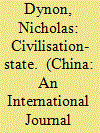

|
|
|
|
|
| Publication |
2014.
|
| Summary/Abstract |
This article analyses the largely overlooked role of the Communist Party of China (CPC) in the promotion of "socialist spiritual civilisation" in contemporising the exemplary role of the Chinese state and in informing the state's efforts to rehabilitate China's cultural traditions. Drawing material from handbooks, newspaper articles and posters published between 1996 and 2002, it may be argued that the ability of the Party to reclaim the achievement of "civilisation" as an ultimate goal in Chinese history has a direct impact on its continuing pursuit to underwrite its long-term legitimacy. This article departs from existing scholarship to locate the CPC's civilising discourses within a historical context that predates the apotheosis of the CPC itself and links them to the sacred mission of maintaining the Chinese civilisation-state.
|
|
|
|
|
|
|
|
|
|
|
|
|
|
|
|
| 7 |
ID:
173978
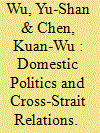

|
|
|
|
|
| Summary/Abstract |
This study examines the association between political competition (elections in Taiwan and political successions in China) and cross-Strait conflicts. We find that the Taiwan president has been more assertive toward mainland China during the election period or in his second term, than during the inter-electoral period or in the first term. The general secretary of the Chinese Communist Party (CCP) reacts to Taiwan’s provocations more harshly when he was in a period of power transition than when he had consolidated power. The two phenomena rest on the same assumption: when a political leader is domestically challenged, he cannot appear weak in external behaviors; when the leader is secure in his position, he can afford to make external concessions. We test the assumption against the empirical evidence from the cross-Strait relations of 1989–2012 and find the most serious conflicts occurred during Taiwan’s electoral period and when the CCP general secretary was in power transition. The study advances our understanding of how conflicts occur in cross-Strait relations and may lead to possible ways of their prevention.
|
|
|
|
|
|
|
|
|
|
|
|
|
|
|
|
| 8 |
ID:
122343
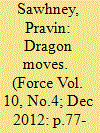

|
|
|
| 9 |
ID:
108209
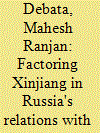

|
|
|
| 10 |
ID:
092688
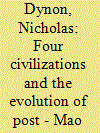

|
|
|
| 11 |
ID:
121255
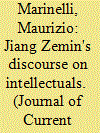

|
|
|
|
|
| Publication |
2013.
|
| Summary/Abstract |
This article focuses on the specific forms of power that are
embodied in the properties and functions of formalised language, as it
was used by Jiang Zemin in crucial political documents on the Party's
policy towards intellectuals. This inquiry illuminates various possibilities
for the normalisation and inculcation of formalised language in the understudied decade of the 1990s, when the mantra "without stability,
nothing can be achieved" became a tautology. The internal constitution
of the selected texts is examined with an eye to the dialogic interaction
with the production and reception of Mao Zedong and Deng Xiaoping's
political discourses on intellectuals (Mao 1942; Deng 1978). The analysis
of language practices and discursive formations in a comparative perspective sheds light on the respective socio�political and historical contexts. It also reveals the extreme involution�devolution of formalised
language in the Jiang Zemin era, when "preserving stability" was reaffirmed as a crucial concern of the Party leadership with the ultimate aim
of preserving its monopoly of power.
|
|
|
|
|
|
|
|
|
|
|
|
|
|
|
|
| 12 |
ID:
072993
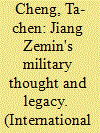

|
|
|
|
|
| Publication |
2006.
|
| Summary/Abstract |
Nearly for 15 years as the Chairman of China's Central Military Commission, Jiang Zemin, albeit lack of real military experience, has gradually developed his military theories and principles in the process of consolidating military authority. Unquestionably, Jiang is not only the core of the third generation leadership in China, but also the most powerful man in China's military until now. That makes researchers interested in exploring military thought of this man controlling the largest armies in the world. In this paper, Jiang's basic military framework, 'Five Sentences', including 'Politically Qualified', 'Militarily Tough', 'Attitudinally Excellent', 'Strictly Disciplined' and 'Materially Guaranteed' will be separately discussed. With interpretations of 'Five Sentences', the author will thereafter provide personal comments and analysis
|
|
|
|
|
|
|
|
|
|
|
|
|
|
|
|
| 13 |
ID:
091540
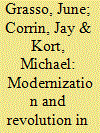

|
|
|
|
|
| Edition |
4th ed.
|
| Publication |
New York, M E Sharpe, 2009.
|
| Description |
ix, 337p.pbk
|
| Standard Number |
9780765623911
|
|
|
|
|
|
|
|
|
|
|
|
Copies: C:1/I:0,R:0,Q:0
Circulation
| Accession# | Call# | Current Location | Status | Policy | Location |
| 054474 | 951.04/GRA 054474 | Main | On Shelf | General | |
|
|
|
|
| 14 |
ID:
114583
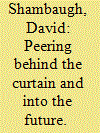

|
|
|
|
|
| Publication |
2012.
|
| Summary/Abstract |
In the autumn of 2012, the Communist Party of China (CPC) will hold its 18th Party Congress. These five-yearly rituals always offer a good opportunity for foreign scholars and analysts to take stock of the "state of the Party". This Congress is particularly important as such a large leadership transition will occur in all major national-level Party institutions (the Central Committee, Central Military Commission, Politburo and its Standing Committee), and the so-called "fifth generation" will take office. But the questions surrounding the CPC today extend much more broadly and deeply than simply the new leaders who will attempt to govern China - the really important questions are more systemic and institutional in nature.
|
|
|
|
|
|
|
|
|
|
|
|
|
|
|
|
| 15 |
ID:
095546
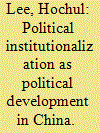

|
|
|
|
|
| Publication |
2010.
|
| Summary/Abstract |
Contrary to many doubts, the institutionalization of political leadership survived the succession process in China between 2002 and 2003. In 2004, Jiang Zemin attempted to override the institutionalized political leadership but was unsuccessful. These episodes demonstrate the level of political institutionalization that has been steadily undertaken since the reform and opening of China. After theoretically defining institutionalization as the first significant stage of political development, this article examines the current progress in political institutionalization at two distinct levels: external and internal. This article argues that the Chinese Communist Party (CCP) leadership intended to establish political stability directly and facilitate economic development indirectly under the goal of sustaining the political legitimacy of the CCP's rule of China. Finally, this article examines whether China would follow the ideal sequence of political development, i.e. institutionalization leading to participation leading to contestation. Though China has achieved considerable political institutionalization and conducted many experiments of expanding political participation, public contestation is still confined solely to within the party. Thus, it remains to be seen whether or not China will follow the ideal sequence.
|
|
|
|
|
|
|
|
|
|
|
|
|
|
|
|
| 16 |
ID:
106167
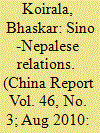

|
|
|
| 17 |
ID:
118494
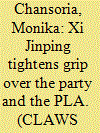

|
|
|